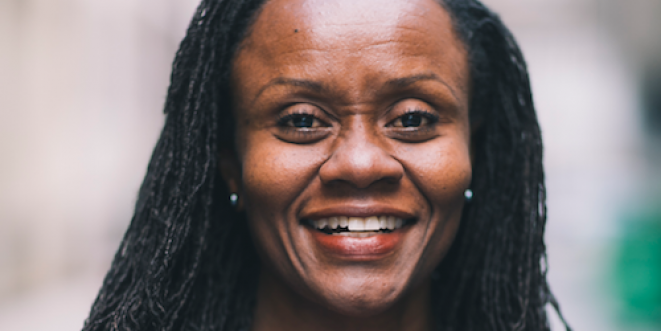Nana Twum-Danso — Using Transportation to Drive Quality Health Care in Ghana
By Temitayo OlofinluaPublished: December 20, 2016

This is part of our 2016 Radiant Health Women of Action series. The Radiant Health Women of Action is our annual highlight of inspiring African women taking action and doing remarkable work to improve the health and well-being of Africans.
As a child, Nana Twum-Danso knew that she wanted to become a medical doctor. Surrounded by role models — her father and sister are doctors — it was a natural choice. After her education in Ghana and the UK, she studied medicine and public health in the United States. With over 15 years’ work experience at international organizations, including the Bill and Melinda Gates Foundation and the Institute for Healthcare Improvement, Twum-Danso returned to Ghana to solve a key health challenge.
Having worked on rural healthcare issues most of her life, she saw a pervasive problem: poor transportation services preventing access to quality healthcare. In December 2015, MAZA was born. Its solution? Rent-to-own motorized tricycles that provide on-demand ambulance service. Through the use of a hotline supported by a mobile technology platform that links the GPS location of motorized tricycles with a dispatch center, drivers are a phone call away. With this model, MAZA creates an affordable and accessible transportation network in rural Ghana.
MAZA came with its own challenges, including choosing an effective operational model. Today, MAZA procures vehicles and leases them out to drivers. The drivers work and pay for the vehicle in two years, during which time they are also on call twice a week to provide community health-care transportation. Through this model, MAZA accomplishes two things: it creates jobs for individuals while also providing communities with transport for health services.
“We need to figure out the right amount of subsidy and make sure the drivers pay us the minimum amount on a regular basis,” says Twum-Danso, pointing out that the organization is still growing, learning and adjusting. In 10 months of operation, MAZA drivers made 77 urgent health-care transportation rides that enabled 86 people in Chereponi District, in the northern region of Ghana, to get prompt medical care. Sixty percent of MAZA’s clients are women in labor or experiencing complications following home delivery, as well as sick newborns.
Unreliable mobile network coverage, lack of a vehicle maintenance culture and drivers defaulting on rent payments are some of the challenges Twum-Danso faces daily, yet she is not stopping. Positive stories of MAZA’s timely intervention spur her on: the woman who gave birth to strong, healthy twins; the sick newborn saved because of quick access to the hospital; the driver who now makes a living from the tricycle.
“We need five additional tricycles to provide more reliable service,” says Twum-Danso. The goal is to have one vehicle for every 2,500 people in an area encompassing 60 square kilometers.
The social enterprise has been well received. Twum-Danso started the project out of her own pocket, but today it is a recipient of generous donations from individuals as well as some global funds, such as the Echoing Green Fellowship, a cash prize from Clearly Vision, and the Innovation grant from USAID Systems for Health Project in Ghana, which they are now trying to match.
In the local communities, MAZA is called nde nde, a local translation of maza maza, which means “quickly” in Hausa, a language common to many West African countries. Talk about local ownership!
MAZA is connecting rural Ghanaians to prompt medical attention, one tricycle at a time.
[MORE]: Meet All the 2016 Radiant Health Women of Action
Like what you're reading? Sign up for our free newsletter and never miss a post! Plus get a FREE digital version of our Issue No.10 with sign up.

- Radiant Health Woman of Action: Olutosin Oladosu Adebowale - November 24, 2014
- Esther Ijewere: Breaking the Silence on Gender-Based Violence - December 21, 2017
- When Silence Is Not Golden - December 10, 2014
- Blessing Timidi-Digha: Advocating for Sexual and Reproductive Health Rights in Nigeria - December 21, 2017
- Folasade Johnson: Giving Hope to Widows in Nigeria - December 21, 2017
- Kemi DaSilva-Ibru: Caring for Survivors of Sexual Assault - December 21, 2017
- R. Evon Benson-Idahosa: Creating New Paths for Survivors of Sex Trafficking - December 21, 2017
- Seun Sangoleye: Nourishing Babies, Empowering Mothers with all Natural African-Inspired Baby Food Line - December 21, 2017
- Virtue Oboro: Making Cribs that Glow Jaundiced Babies to Health - December 21, 2017
- Oluremi Adetoba: A Life Dedicated to Children With Special Needs - December 21, 2017











